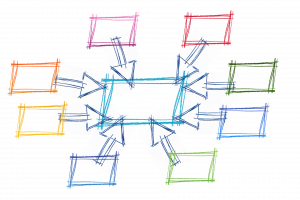2.7 Final Thoughts on Close Reading

Compare the paragraph you just wrote to your earlier essay on Charles Justice’s “The Ultimate Communications App.” You will likely see the improvement that gathering focused pieces of evidence brings to analyzing the author’s complex argument. Now that you are comfortable gathering information and crafting an observational paragraph, we will take the next step toward focusing that information into a purposeful thesis.
When you revise an observational paragraph into your unique and controversial text reading, you must capture the original text’s main argument and highlight the article’s main points (including any key concepts or theories) while eliminating all extraneous or minor details. Review your observational paragraph and consider how you might revise it into a purposeful thesis that analyzes the author’s complex argument.
In the next chapters, we will review the writing process, including composing thesis statements and constructing supporting paragraphs. This means that you want to do a little more than summarize or simply restate what is in the text. You want your readers to understand right away that this is your reading of the text that follows from the evidence within the text that you have chosen.
You are not summarizing, rather you are persuading your readers to see what they can learn about a text by reading it your way.

